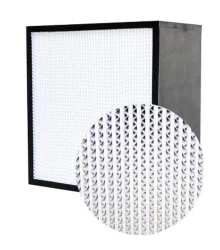Features and Characteristics of HEPA Filters
2024-06-07
High-Efficiency Particulate Air (HEPA) filters are specialized air filters designed to capture and remove a high percentage of airborne particles and pollutants from the air. These filters are commonly used in air purifiers, HVAC systems, cleanrooms, medical facilities, and other environments where clean air quality is essential. Here are some key features and characteristics of HEPA filters:
1. Filtration Efficiency: HEPA filters are highly efficient at capturing particles as small as 0.3 microns with a minimum efficiency of 99.97%. This means that HEPA filters can remove at least 99.97% of airborne particles of 0.3 microns or larger from the air passing through them. They are also effective at capturing larger and smaller particles with even higher efficiency.
2. Construction: HEPA filters are composed of a dense network of randomly arranged fibers, typically made of fiberglass, synthetic polymer, or other materials. These fibers create a maze-like structure that traps particles as air passes through the filter. HEPA filters may have a pleated or folded design to increase the filter surface area and maximize particle capture.
3. HEPA Filter Classes: HEPA filters are classified into different categories based on their efficiency and performance. The most common classifications include:
- HEPA-H13 and HEPA-H14: These filters offer high filtration efficiency and are used in critical applications such as cleanrooms, hospitals, and pharmaceutical manufacturing facilities.
- True HEPA: True HEPA filters meet the stringent standards set by the United States Department of Energy (DOE) and are capable of capturing 99.97% of particles 0.3 microns in size or larger.
- HEPA-Type or HEPA-Like: These filters may have lower filtration efficiency than true HEPA filters and may not meet the same standards. They are often used in residential air purifiers and HVAC systems.
4. Applications: HEPA filters are used in a wide range of applications where clean air quality is essential, including:
- Residential Air Purifiers: HEPA filters are commonly used in portable air purifiers and HVAC systems to remove airborne allergens, dust, pet dander, pollen, mold spores, and other pollutants from indoor air.
- Commercial and Industrial Settings: HEPA filters are used in commercial buildings, offices, schools, and industrial facilities to maintain clean air quality and comply with regulatory requirements for indoor air quality (IAQ) standards.
- Healthcare Facilities: HEPA filters are used in hospitals, clinics, laboratories, and operating rooms to prevent the spread of airborne pathogens, bacteria, and viruses, and to protect patients, healthcare workers, and sensitive medical equipment.
- Cleanrooms: HEPA filters are essential components of cleanroom environments used in semiconductor manufacturing, biotechnology, pharmaceuticals, and other industries requiring ultra-clean conditions to prevent contamination of products and processes.
5. Maintenance and Replacement: Regular maintenance and replacement of HEPA filters are essential to ensure optimal performance and efficiency. Filters should be inspected, cleaned, or replaced according to manufacturer recommendations to maintain clean air quality and prevent clogging or reduced airflow.
Overall, HEPA filters are highly effective at removing airborne particles and pollutants from indoor air, providing clean and healthy air quality in residential, commercial, industrial, and medical environments. By incorporating HEPA filtration technology into air purification and ventilation systems, individuals can enjoy cleaner air and a healthier living or working environment.



